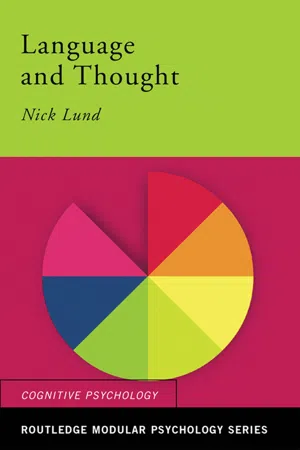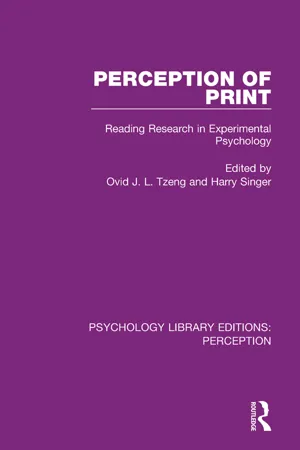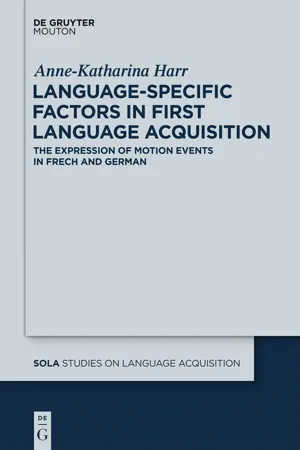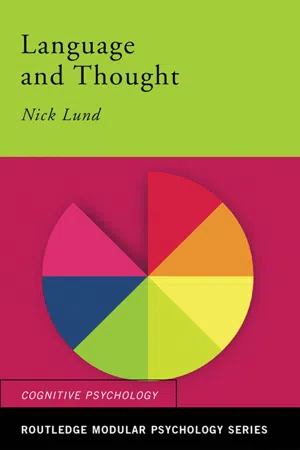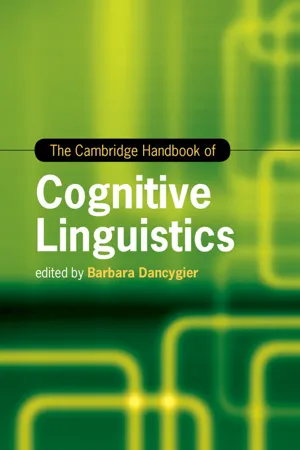Languages & Linguistics
Linguistic Determinism
Linguistic determinism is a theory suggesting that language shapes and influences the way people think and perceive the world. It proposes that the structure and vocabulary of a language directly impact an individual's cognition and worldview. This concept implies that different languages may lead to distinct thought patterns and cultural perspectives.
Written by Perlego with AI-assistance
Related key terms
1 of 5
5 Key excerpts on "Linguistic Determinism"
- eBook - PDF
- Nick Lund(Author)
- 2014(Publication Date)
- Routledge(Publisher)
Furthermore, we cannot use language without thinking about what we want to say. Thus, in adults at least, language and thought seem closely entwined. There are four main views about the nature of this relationship between language and thought: 1. The language we speak determines or influences the way we think. 2. The way we think determines the use of language. 3. Language and thought are independent but gradually become interdependent during infancy. 4. Language and thought are independent. The first of these views has been labelled the linguistic relativity hypothesis and is largely associated with Whorf; the second represents a view held by Piaget; the third by Vygotsky. These three views on the relationship between language and thought are discussed in this chapter. The fourth view has been proposed by Chomsky and is discussed in Chapter 5. The linguistic relativity hypothesis (LRH) proposes that language influences the way people perceive and think about the world. This hypothesis concentrates on the differences in both vocabulary and grammar between different languages and suggests that speakers of a particular language are led to think, perceive and remember the world in a way peculiar to that language. Users of different languages will therefore tend to view the world differently. The theory is often traced back to the work of the linguist Sapir (1929) who compared English to a number of Native American languages. He concluded that the differences between the languages changed the way people perceive their environments. However, the LRH has become most closely associated with the work of Whorf (1956). He was another linguist LANGUAGE AND THOUGHT 10 The linguistic relativity hypothesis who studied Native American languages and he became convinced that the differences between languages determined the types of thought people were able to have. - eBook - ePub
Perception of Print
Reading Research in Experimental Psychology
- Ovid J.L. Tzeng, Harry Singer(Authors)
- 2017(Publication Date)
- Routledge(Publisher)
Another important aspect of our orthography-based Linguistic Determinism is its emphasis on processing rather than on production differences. That is, we are not arguing that the ultimate semantic structures would differ just because different notational systems are used to create them. After all, mathematical computation should be understood to be completely independent of the particular way it is physically realized. But this in no way denies the possibility that the same understanding may be achieved via different mental processes. For instance, a text can be analyzed into a set of coherent propositions, which in turn can be represented in either a graphic layout with connecting nodes (Rumelhart, Lindsay, & Norman, 1972) or a sequential list of arguments and relations (Kintsch, 1974). A similar text base can be recovered from either representation. However, these different representations have different functional values and may require different processing assumptions (Anderson, 1978). Therefore, a Linguistic Determinism with emphasis on processing rather than production differences needs not necessarily lead to the conclusion of linguistic relativity.Such a hypothesis of Linguistic Determinism should not be limited to the area of mathematics where the advancements involve only a handful of talented mathematicians. The hypothesis should include equally strong statements concerning the design of writing systems, and its predictive power should be easily applicable to the behavior in reading various types of scripts. After all, written languages are no more than special types of notations. Unlike spoken languages, which are part and parcel of our organismic structure, they are the intentional creation of human beings to expand the act of communication. Sliding our tongues and maneuvering air through our superlaryngeal tracts are no more foereign to us than programming one’s own arms to move, wave, grasp, or make gestures. Using written language to communicate, on the other hand, requires the utilization of something external to us: conventional notation systems invented by human beings. Inasmuch as these new notational symbols are arbitrary inventions external to our organismic structure, both accommodation and assimilation processes must have worked at their extremes in order for us to achieve efficiency in manipulating them. For example, our visual system is biologically wired (Fowler, Chapter 8 - eBook - PDF
Language-Specific Factors in First Language Acquisition
The Expression of Motion Events in French and German
- Anne-Katharina Harr(Author)
- 2012(Publication Date)
- De Gruyter Mouton(Publisher)
48 The argument that culture strongly influences languages has been mentioned in Chap- ter 1.2.4 and will not be further discussed here. For an argument in favour of this hypothesis, cf. Li and Gleitman (2002). 44 Linguistic Determinism and “thinking for speaking” Note that Boas had already expressed this idea when he said: It seems fairly evident that the selection of such simple terms must to a certain extent depend upon the chief interests of people; and where it is necessary to distinguish a certain phenomenon in many aspects, which in the life of the people play each an entirely inde- pendent role, many independent words may develop, while in other cases modifications of a single term may suffice. (Boas 1911: 26) And recall the study by Dougherty and Keller (1985), mentioned in Chapter 1.2.2, which showed that the categorization of blacksmiths’ tools is influenced by their everyday technological activity which requires attention to specific entities or features. 49 Their conclusion is quite similar to that of E. Clark and H. Clark (1978) and Boas (1911), although, according to them, lexical concepts did not seem to have an influence on classification (cf. Dougherty and Keller 1985: 171). 2.5 Conclusion Before concluding this discussion about the extent to which language influences thought, it must be pointed out that there is so far no consensus “about the ques- tion how to define the criterion for ‘having an impact on’” (Gentner and Goldin- Meadow 2003: 12). Consequently, results that some researchers take as positive evidence for an influence of language on thought are not recognized as such by others. Current theorists in the field of linguistic relativity usually reject the idea that speakers of different languages have different views of the world. - eBook - ePub
- Nick Lund(Author)
- 2014(Publication Date)
- Routledge(Publisher)
Carruthers, 1996 ), as adults much of our thinking seems to involve words and language. Furthermore, we cannot use language without thinking about what we want to say. Thus, in adults at least, language and thought seem closely entwined. There are four main views about the nature of this relationship between language and thought:- The language we speak determines or influences the way we think.
- The way we think determines the use of language.
- Language and thought are independent but gradually become interdependent during infancy.
- Language and thought are independent.
The first of these views has been labelled the linguistic relativity hypothesis and is largely associated with Whorf; the second represents a view held by Piaget; the third by Vygotsky. These three views on the relationship between language and thought are discussed in this chapter. The fourth view has been proposed by Chomsky and is discussed in Chapter 5 .The linguistic relativity hypothesis
The linguistic relativity hypothesis (LRH) proposes that language influences the way people perceive and think about the world. This hypothesis concentrates on the differences in both vocabulary and grammar between different languages and suggests that speakers of a particular language are led to think, perceive and remember the world in a way peculiar to that language. Users of different languages will therefore tend to view the world differently. The theory is often traced back to the work of the linguist Sapir (1929 ) who compared English to a number of Native American languages. He concluded that the differences between the languages changed the way people perceive their environments. However, the LRH has become most closely associated with the work of Whorf (1956 ). He was another linguist who studied Native American languages and he became convinced that the differences between languages determined the types of thought people were able to have. The theory is often referred to as the Sapir– Whorf hypothesis or, because of the greater influence of Whorf’s ideas, the Whorfian hypothesis - Barbara Dancygier(Author)
- 2017(Publication Date)
- Cambridge University Press(Publisher)
Without the usage-based approach that cognitive linguis- tics advocates, these implications would remain out of sight. 1.3 Conclusion The challenge now is to further enrich our understanding of the causal influence of use on structure in language, and thus to see better how it is that only human cognition supports language. A first move is to broaden the scope of the key ideas – influence, use, and structure – with a concerted Language in Cognition and Culture 17 and systematic approach to discovering how the multiple causal-temporal frames of language use operate, both in themselves and in relation to each other. Like the rest of cognitive linguistics, this work is as much about culture as it is about language, for language is not only a form of culture – being a local and historical cumulation of social practice – but it is our main tool for constructing culture itself. 18 E N F I E L D 2 Relationships between Language and Cognition Daniel Casasanto 2.1 Language, Cognition, and the Goals of Cognitive Linguistics Understanding relationships between language and thought is fundamental to cognitive linguistics. Since the 1970s, cognitive linguists have sought to build cognitively informed theories of language. Such theories are exemplified by Ronald Langacker’s (2008a) Cognitive Grammar or Charles Fillmore’s (1988) Construction Grammar. With the rise of Conceptual Metaphor Theory (Lakoff and Johnson 1980a), however, a second, complementary goal began to drive research in cognitive linguistics: the goal of building linguis- tically informed theories of cognition. According to George Lakoff, “the locus of metaphor is not in language at all, but in the way we conceptualize one mental domain in terms of another” (1993: 203).
Index pages curate the most relevant extracts from our library of academic textbooks. They’ve been created using an in-house natural language model (NLM), each adding context and meaning to key research topics.
